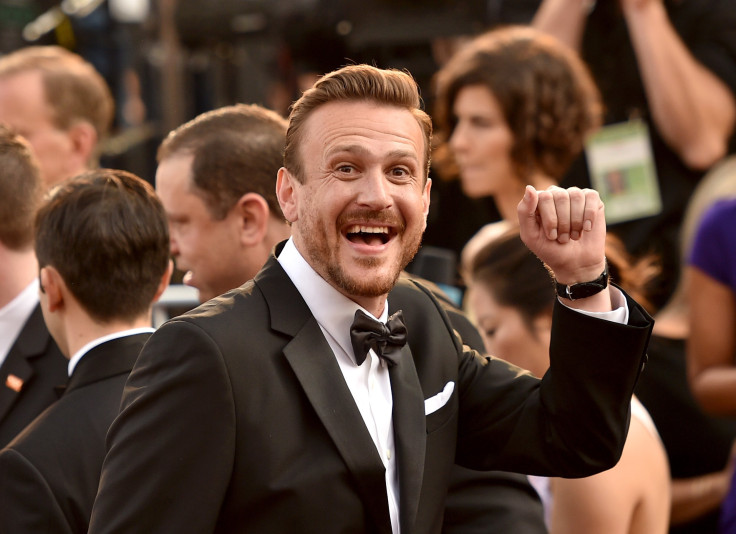Harvey Weinstein Reveals The ‘Jabba The Hutt Mentality’ Of Powerful Men, Says Jason Segel

He was one of the Freaks and Geeks, he was the guy trying to forget Sarah Marshall, he wrote a Muppet movie, he starred on “How I Met Your Mother” and he even played David Foster Wallace. Now, in a podcast interview with International Business Times, actor Jason Segel weighs in on the Harvey Weinstein scandal consuming the entertainment industry. The Hollywood veteran said the situation exemplifies how powerful men have “a Jabba the Hutt mentality” in which they exude “a deep down, core belief that everything is purchasable.”
Subscribers can click here to listen to the full podcast interview.
IBT caught up with Segel during his tour to promote a new novel he co-authored called Otherworld. The action-adventure book explores the dark sides of virtual reality and immersive technologies. Segel tells IBT that the book should warn kids that these technologies are not “being offered to you by people who care about your well-being — they’re being offered to you by people who want to monetize your happiness.”
What follows is a lightly edited excerpt of the podcast interview.
What prompted you to write a book about virtual reality?
I was trying the Oculus Rift at Sundance Film Festival a few years ago. They had a demo right before the consumer release, and I got put through their demo with a bunch of different scenarios. I remember I thought two things. First, I thought they've finally cracked it. There's this promise of virtual reality since we were kids, but it was always so clunky and it was at the State Fair, and you were so aware that you were wearing this weird suit. I was like, “Oh, they've done it.” It's only going to get better from here.
Then I had this thought: If your life is not a life that you're really enthused by, why would you ever leave this? If you go from working a job you don't enjoy, and an apartment you don't enjoy, to being able to put on a headset and be in a beautiful mansion and be king of your own skull-sized kingdom, as David Foster Wallace quote, why would you ever leave?
Do you think we are headed for a future where we are all plugged into virtual reality and ignoring the world around us?
I think that there are a few actual potential dead-ends to this road we're on. I think there might be some version because I've been forced to think about technology a lot in doing these books. I think there may be some version where we realize you cannot secure things digitally… Your bank account is not safe if it's all digital. Your election is not safe if it's all digital.
Pretty soon, there's always emerging technologies that they say are for film editing. Honestly, where you can replicate somebody's voice with only a 30-minute sample of them talking? You're going to be able to do it visually, too. Then everything is plausible deniability...
This virtual reality in this book is literal but it can also be used as a metaphor. We are in the middle of a “what is real?” revolution. From fake news to the Instagram life that we all present. That's virtual reality.
Our life is not all made up of perfectly staged photos of food, but that's how we present ourselves. Look how great my day was, and all of a sudden people are wondering why they feel less than [everyone else]. Because we're all comparing our insides to other people's outsides.
There is a debate about technology. On one side there are the triumphalists who say technology's going to solve all the world's problems. On the other side are those warning that technology is destroying the world. Where do you come down?
Like any complicated issue, it's a mix of all of those things. But obviously when someone is trying to sell you something, they only put out the positive aspects of it. So we were told this was going to bring us closer together. Social media's going to allow us all to engage with people we never would have the opportunity to talk to or meet.
Then at the same time I think in a lot of ways it's dehumanized us. There's a road rage phenomenon to social media, where people all of a sudden feel comfortable to say horrible things that you would never say to somebody's face in real life. What's really scary is that I think that people are becoming accustomed to that being acceptable… [It] is slowly becoming okay to say those things to people face to face.
We're seeing people clash in these terrible protest, counter protest, and people screaming at each other and so I think in a lot of ways we've become less sophisticated socially because of technology.

What do you hope young people take away from your book?
First of all, this is a fun adventure. It's like Last Star Fighter, which are [the] kind of movies I loved. It has all of that stuff, the Matrix. I remember when I saw the Matrix I was like, “Oh, this changes everything for me.” I'll never write something adventure-wise that’s not influenced by the Matrix.
But also, what it really is about is this deep belief I have that we have to make sure not to trade in this living human interaction for this false promise of something better, because none of that is being offered to you by people who care about your well-being. They're being offered to you by people who want to monetize your happiness.
We already are so close to companies like Amazon being able to provide all of your needs. Already, I'd leave my house less…because Amazon will bring it to me. That's not a great thing. There are ways to use [technology] that are important. It's important to get out into your community and to see people. It's about finding that balance.
How do you think the Harvey Weinstein scandal will change Hollywood?
I think my first answer is okay, well obviously we can get out of the way that sexual assault and rape is a terrible thing, so let's get that out of the way as an obvious statement that everybody should accept. I think that there is another really dark issue at play in the whole scenario, which is powerful people — usually powerful men — having a deep down, core belief that everything is purchasable...including your dignity and I will find the price at any cost, and if I don't find the price, I still don't believe you and I'll take it.
It's a really deep, dark, scary point of view. I think it's rearing its ugly head and you're finding out, “Oh, powerful men seem to have that belief.” That's not a belief that I hold and I hope this moment makes everybody sort of look at that idea — that it's not all purchasable, especially dignity. You can't just take what you want.
Do you think the revelations of sexual harassment and sexual assault will make it more difficult to portray issues of gender and sexuality in comedy?
I think first of all, we'll be in a moment of everybody figuring out levels for a long time and appropriately so. We should all be thinking about these issues, thinking in a serious away. Till the dust settles, I don't think anyone should go near those issues, certainly comedically…
I think that there is a real distinction to be drawn between juvenile attitudes and predatory attitudes. Those are really distinctly different things. There are periods where men and women alike are figuring out how to interact with the opposite sex. Those talks need to be able to be had also. That's a living dynamic also, but when it switches into predatory zone, it's a different thing. It's about power.
I don't think that those interactions are very much about sex. It's a Jabba the Hutt mentality of, I'm going to own this.
© Copyright IBTimes 2024. All rights reserved.






















